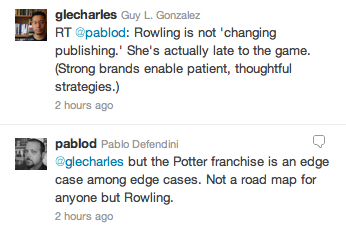Book industry circles are abuzz with the news that J K Rowling has created Pottermore, an interactive website for all things Harry Potter. It is to be launched on Harry’s birthday. (Awww.)
The site is a large-scale transmedia production. It will allow users to “roam in Harry’s world, to uncover back stories and other additional material” create their own content, play games, and interact. This is a thoughtful brand and content expansion that meets an audience need.
But what’s attracting all the attention is that Pottermore will also be the exclusive retailer of the Harry Potter e-books. J K Rowling is still partnering with her publishers in this venture, but they are bypassing retailers completely. Not surprisingly, booksellers are upset. Waterstone’s was disappointed because they see themselves as “having been a key factor in the growth of the Harry Potter phenomenon since the first book was published,” and now find themselves “effectively banned from selling the long-awaited e-book editions of the series.”
But Rowling has made a shrewd business move and few people can deny that. The question is: How will this impact the industry as a whole? Is this a game changer? There’s been a lot of discussion on this topic on Twitter today, and for the most part, this is seen as the exception and not the rule.

Harry Potter is an incredibly strong brand that can afford to go out on its own. Demand is high and consumers will find the content they want wherever it is posted. As Sarah Weinman put it in her insightful blog post, Rowling’s e-book strategy is B2C, and the industry norm in any format has been B2B. Publishers have been discussing B2C strategies for some time now but it hasn’t been widely adopted or really well developed by most.
Going straight to the reader is ideal for authors and publishers, but those readers have to be paying attention and be able to recognize you. This is why Pottermore’s strategy can’t be easily applied elsewhere. The kind of following Harry Potter has is beyond what most books have ever seen.
As an aside, it’s not clear why the author-publisher partnership came to be in the first place and how others could make this work. Many are wondering why the author stuck with her publishers on this one since it seems that she retained e-book rights.
As the conversation continues we’d like to know what you think.
- Do you think Rowling and the publishers should have cut out retailers?
- Why do you think Rowling collaborated with her publishers instead of bypassing them as well?
- Will this be a one-off or will it change publishing and bookselling?
Check out @glecharles, @pablod and @sarahw for some good Pottermore chatter.


